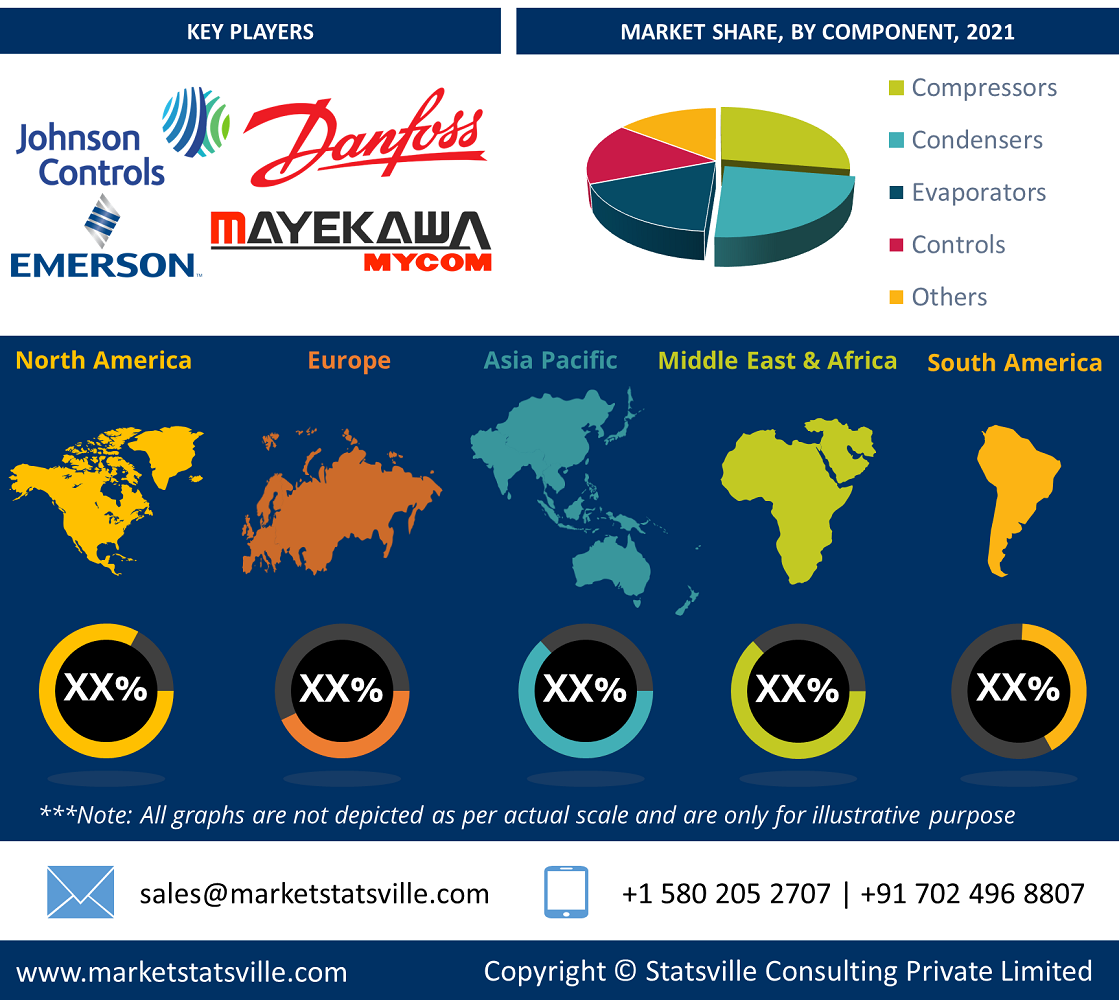Industrial Refrigeration Systems Market size is expected to grow USD 3,815.2 million by 2030
According to the Market Statsville Group (MSG), the Global Industrial Refrigeration Systemic s Market size is expected to grow from USD 2,056.1 million in 2021 to USD 3,815.2 million by 2030 at a CAGR of 7.1% from 2022 to 2030. The growing use of packaged and processed foods and beverages worldwide and the growing need to preserve them from spoiling is driving up demand for industrial refrigeration systems. Concerns about global warming have shifted manufacturers' focus away from harmful coolants and toward natural refrigerants. As natural refrigerants are both climate-neutral and inexpensive to produce, demand for natural refrigerant-based equipment has risen, opening up numerous growth opportunities for the market. The increased use of natural refrigerants such as carbon dioxide (CO2), ammonia (NH3), and others has reduced the emissions of harmful gases that contribute to global warming. As consumer awareness of harmful hazards has grown, manufacturers' focus has shifted from the thermodynamic properties of refrigerants to their Ozone Depletion Potential (ODP) and Global Warming Potential (GWP). As a result, there has been an increase in global demand for natural refrigerant-based industrial equipment. Key industry players are widely adopting natural refrigerants as a step toward social responsibility in order to reduce ozone layer depletion.
Over the forecast period, the emerging trend of improved and enhanced cold chain systems around the world is expected to positively impact the market. This is largely due to the growing share of global online grocery sales. Moreover, cold chains play an important role in the post-harvest industry by assisting in the reduction of harvest spoilage through the use of technologies such as absorption refrigerators and passive/evaporator coolers. Excessive heat and high temperatures are also contributing to market growth. However, due to lower budgets for advanced equipment, the deployment of cold chains is low in developing countries.
Besides that, the rising integration of Artificial Intelligence (AI), the Internet of Things (IoT), and next-generation technology in refrigeration systems offer lucrative opportunities for the market.
COVID-19 Impact on the Industrial Refrigeration Systems Market
The world economy is shrinking due to the COVID-19 pandemic, which is causing havoc on global economic activity. While, the deployment of refrigerated transportation systems increased during this period due to the need for large quantities of vaccine preservation in order to control the spread of the virus. The Centers for Disease Control and Prevention (CDC) in the United States has issued specific guidelines for vaccine storage, recommending the use of pharmaceutical-grade or purpose-built units designed to either freeze or refrigerate vaccines. The temperature should be kept between -50°C and -15°C for freezers and 2°C and 8°C for refrigerators, according to the agency. Moreover, the constant demand for vaccine storage and distribution and effective pharmaceuticals have stabilized the market.
Scope of the Industrial Refrigeration Systems Market
The study categorizes the industrial refrigeration systems market based on component, capacity, refrigerant, and application at regional and global levels.
By Component Outlook (Sales, USD Million, 2017-2030)
Compressors
-
Rotary Screw Compressors
-
Centrifugal Compressors
-
Reciprocating Compressors
-
Other Compressors
Condensers
Evaporators
Controls
Others
By Capacity Outlook (Sales, USD Million, 2017-2030)
-
Less than 100 kW
-
100-500 kW
-
500kW-1,000 kW
-
1,000kW-5,000 kW
-
More than 5,000 kW
By Application Outlook (Sales, USD Million, 2017-2030)
-
Refrigerated Warehouse
-
Food & Beverage
-
Chemical, Petrochemical, & Pharmaceutical
-
Refrigerated Transportation
By Refrigerant Outlook (Sales, USD Million, 2017-2030)
-
Ammonia
-
CO2
-
HFC
The compressors segment is projected to account for the largest market share, by Component
In 2020, the compressors segment accounted for the largest revenue share of the overall market and is expected to grow across the forecast period. Key players are also investing heavily in storage cabinets, display cases, coolers, and heat exchangers, which is propelling the growth of the other's segment. Furthermore, the evaporators segment is expected to grow significantly as a result of the growing demand for energy-efficient and dependable systems. The ability of evaporators to intensify cooling by absorbing excess heat is critical to refrigerator cooling performance.
North America is projected to account for the highest market share, by Region
North America had the highest revenue share in 2021 and is expected to grow steadily over the forecast period. This expansion can be attributed to the rapid expansion of online grocery business operations, which has created a demand for refrigerated storage systems to keep perishable food materials fresh. Furthermore, clinical trials and research to slow the spread of the COVID-19 pandemic across the region are driving market growth in North America.
Asia Pacific is expected to grow with the fastest CAGR during the forecast period. This is due to the growing demand for cold storage infrastructure in China, India, and Japan. The government has launched a number of initiatives to support the expansion of cold storage infrastructure and to make refrigerated warehouses and refrigeration more manageable in the country.
Key Market Players in Industrial Refrigeration Systems Market
The industrial refrigeration systems market is mildly concentrated in nature, with few numbers of global players operating in the market, such as:
-
Johnson Controls
-
Emerson Electric Co.
-
Danfoss
-
Mayekawa Mfg. Co., Ltd
-
Bitzer Kühlmaschinenbau GmbH
-
Evapco, Inc
-
Güntner GmbH & Co. KG
-
LU-VE S.p.A
-
Ingersoll Rand plc
-
United Technologies Corporation
-
GEA Group
-
Daikin Industries Ltd
-
Dover Corporation
-
Baltimore Aircoil
-
Lennox International
-
Others

